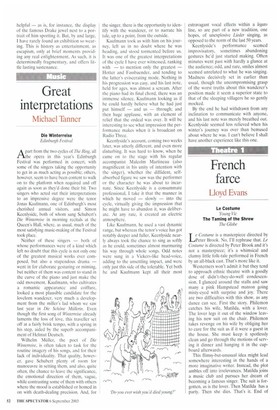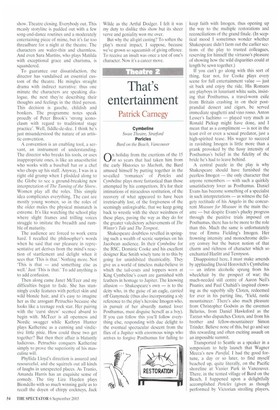French farce
Lloyd Evans
Le Costume Young Vic The Taming of the Shrew The Globe
T e Costume is a masterpiece directed by Peter Brook. No, I'll rephrase that. Le Costume is directed by Peter Brook and it's not a masterpiece; it's a whimsical and clumsy little folk-tale performed in French by an all-black cast, That's more like it.
Westerners won't admit it but they tend to approach ethnic theatre with a goodly dose of didn't-they-do-well condescension. I glanced around the stalls and saw many a pink Hampstead matron going misty-eyed with surprise and joy. There are two difficulties with this show, as any dunce can see. First the story. Philemon catches his wife, Matilda, with a lover. The lover legs it out of the window leaving his new suit on the chair. Philemon takes revenge on his wife by obliging her to care for the suit as if it were a guest in the house. She must keep it spotlessly clean and go through the motions of serving it dinner and hanging it in the cupboard afterwards.
This flimsy-but-unusual idea might lead somewhere interesting in the hands of a more imaginative writer. Instead, the plot ambles off into irrelevances. Matilda joins a music club and pursues her dream of becoming a famous singer. The suit is forgotten, as is the lover. Then Matilda has a party. Then she dies. That's it. End of show, Theatre closing. Everybody out. This measly storyline is padded out with a few song-and-dance routines and a moderately entertaining piece of mime, but it's far too threadbare for a night at the theatre. The characters are wafer-thin and charmless. And even Sara Martins, who plays Matilda with exceptional grace and charisma, is squandered.
To guarantee our dissatisfaction, the director has vandalised an essential custom of the theatre. He mingles straight drama with indirect narrative: thus one minute the characters are speaking dialogue, the next they're describing their thoughts and feelings in the third person. This decision is gauche, childish and honkers. The programme notes speak proudly of Peter Brook's 'strong iconoclasm with regard to traditional stage practice'. Well, fiddle-de-dee. I think he's just misunderstood the nature of an artistic convention.
A convention is an enabling tool, a servant, an instrument of understanding. The director who breaks his tools, or uses inappropriate ones, is like an anaesthetist who works with a baseball bat or a chef who chops up his staff. Anyway, I was in a right old grump when I plodded along to the Globe to see a ground-breaking new interpretation of The Taming of the Shrew. Women play all the roles. This simple idea complicates everything. The cast are mostly young women, so in the roles of the older males the physical mismatch is extreme, It's like watching the school play where slight frames and trilling voices struggle to imitate the breadth and rumble of maturity.
The audience are forced to work extra hard. I recalled the philosopher's words when he said that our pleasure in representative art derives from the mind's reaction of startlement and delight when it sees that 'This is that.' Nothing more. Not 'This is that — and something else as well.' Just This is that.' To add anything is to add confusion, Then along came Janet McTeer and my difficulties began to fade. She has stunningly cocky features with perfect skin and wild blonde hair, and it's easy to imagine her as the arrogant Petruchio because she looks like a teenage rock star. Her pairing with the `curst shrew' seemed absurd to begin with. McTeer is all openness and Nordic swagger while Kathryn Hunter plays Katherine as a cunning and vindictive little pixie. How could these two get together? But then their affair is blatantly ludicrous. Petruchio conquers Katherine simply to prove the superiority of his masculine will.
Phyllida Lloyd's direction is assured and resourceful, and she squirrels out all kinds of laughs in unexpected places. As Trani°, Amanda Harris has an exquisite sense of comedy. The tiny Liza Hayden plays Biondello with so much winning guile as to recall the doyen of chirpy cockneys, Jack Wilde as the Artful Dodger. I felt it was my duty to dislike this show but its sheer verve and geniality won me over.
But why the all-girl casting? To soften the play's moral impact, I suppose, because we've grown so squeamish of giving offence. To receive an insult was once a test of one's character. Now it's a career move.











































































 Previous page
Previous page